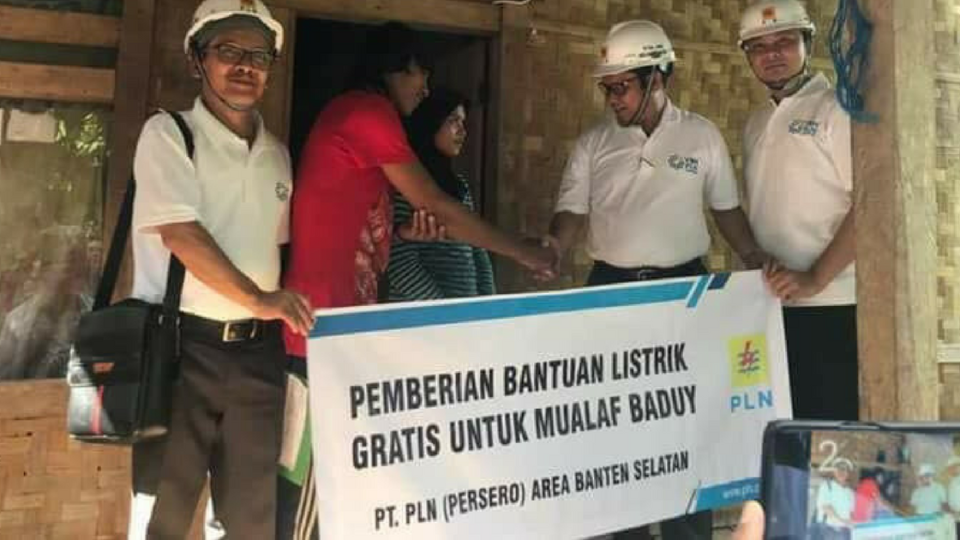So, you may remember a story from earlier this week about a church charity event in Yogyakarta that was shut down on Sunday by Islamic hardliner groups accusing the church of “Christianization” (a local term for conspiratorial attempts by Christians to convert Muslims) since the event involved selling low-priced packages of food staples to low-income families.
Wonder what those groups would call this?
https://www.facebook.com/4bright.indonesia/photos/a.811741068873836.1073741829.809380215776588/1725696727478261/?type=3&theater
This viral picture shows men holding a banner that says “Giving free electricity aid to Mualaf Baduy” and below that it says PT PLN (Persero) South Banten.
The Baduy are a traditional Bantenese community that have long been largely isolated from the rest of Indonesian society and followed their own indigenous spiritual beliefs known as Agama Sunda Wiwitan.
Mualaf is a term used to describe those who wish to convert or have recently converted to Islam.
PLN is Indonesia’s state-run electricity utility operator.
Put that together, and it kinda looks like a state-run company is offering citizens free electricity to change their religion.
But, according to PLN, that is not the case and the banner in the above viral photo is simply mistaken.
“It’s just that banner is mistaken, so it’s become a commodity on social media and been misinterpreted,” said PT PLN corporate communication head I Made Suprateka to CNN Indonesia today.
According to Suprateka, the electricity aid money was indeed given to members of the Baduy that had converted to Islam, but that money did not come from PLN. Rather, the money was dispersed by Yayasan Baitul Mal (YBM), a charity established by employees of PT PLN in South Banten.
Suprateka said that PLN as an institution would never favor any ethnic or religious group over another but defended the donation by the PLN employee charity as a pure form of ibadah (worship) to empower Baduy who had converted to Islam.
According to media reports, the charity gave a total of IDR351 million (US$24.500) to Baduy converts to cover electricity payments in addition to assistance in installing electricity into their homes and businesses and agricultural seeds.
“The distribution of aid was given to Baduy citizens who have converted to Islam so they can live independently and are able to manage their businesses,” said Feyza Ulufiyah, the head of Wantisari Village in the subdistrict of Lebak, as quoted by Tempo.
Even if it wasn’t PLN that gave the money to the Baduy converts, are Indonesians really okay with charities giving people financial incentives to convert to Islam? (The difference between this and the Yogyakarta church charity event that got shut down by Islamic hardliners are hopefully obvious to all.)
Followers of Indonesia’s indigenous religions only recently won the right to declare their faith on their official state ID cards’ mandatory religion category (as opposed to declaring themselves a member of one of Indonesia’s six officially recognized religions or leaving it blank). While many considered it a victory for religious freedoms, others have been concerned that it could ultimately lead to greater persecution of religious minority groups.




